Maggie Secara's Blog, page 7
June 19, 2013
TK McEachin: You call that a review?
 Not long ago, I met freelance writer T.K. McEachin in a writers' group on Facebook. She struck me as young (well, younger than me!) and smart, full of opinions, and remarkably grounded, and we got along famously. Not that we always agree, but when it comes to writing advice, we tend to be on the same train. Based in Atlanta, T.K. has written for Black Literature Magazine, and is currently with a cable tv station. I was delighted when she agreed to be my guest this week. See what you think.
Not long ago, I met freelance writer T.K. McEachin in a writers' group on Facebook. She struck me as young (well, younger than me!) and smart, full of opinions, and remarkably grounded, and we got along famously. Not that we always agree, but when it comes to writing advice, we tend to be on the same train. Based in Atlanta, T.K. has written for Black Literature Magazine, and is currently with a cable tv station. I was delighted when she agreed to be my guest this week. See what you think. It’s no secret to those who know me personally that I am not a huge fan of the Harry Potter novels. Needless to say, if these novels or any others encourage reading in children, that alone is reason enough to admire & respect the authors. So, a few months ago, J.K. Rowling entered the adult fiction genre with her latest book, The Casual Vacancy. After reading so many of the bad reviews that were unrelated to the quality of the book itself, I realized one thing: many readers simply do not understand the purpose of the reviewing ability that Amazon, Barnes & Noble, as well as many other sites give them. I also estimate that any where from 10-40% of reader reviews are unfair & biased (which is their right upon coughing up the cash for the book, technically). Some of these are irrelevant in that they tell you nothing about the book itself. I’m one of those avid readers who will peruse dozens of reviews (if available) for a work of fiction, to aid in my buying decision and I am notorious for writing very honest reviews myself. This is especially the case when deciding whether or not to buy a new book that a seasoned author has written, when I didn’t care for the previous one(s). Even if I don’t like a book, I don’t always give up on an author and when reviewing, I try to find some redeeming quality to share along with the negative aspects. After all, I’m a writer as well.
It’s no secret to those who know me personally that I am not a huge fan of the Harry Potter novels. Needless to say, if these novels or any others encourage reading in children, that alone is reason enough to admire & respect the authors. So, a few months ago, J.K. Rowling entered the adult fiction genre with her latest book, The Casual Vacancy. After reading so many of the bad reviews that were unrelated to the quality of the book itself, I realized one thing: many readers simply do not understand the purpose of the reviewing ability that Amazon, Barnes & Noble, as well as many other sites give them. I also estimate that any where from 10-40% of reader reviews are unfair & biased (which is their right upon coughing up the cash for the book, technically). Some of these are irrelevant in that they tell you nothing about the book itself. I’m one of those avid readers who will peruse dozens of reviews (if available) for a work of fiction, to aid in my buying decision and I am notorious for writing very honest reviews myself. This is especially the case when deciding whether or not to buy a new book that a seasoned author has written, when I didn’t care for the previous one(s). Even if I don’t like a book, I don’t always give up on an author and when reviewing, I try to find some redeeming quality to share along with the negative aspects. After all, I’m a writer as well.In order to determine if these biased ratings on the part of reader reviewers (vs professional criticism) seems to be a trend, I analyzed the bad reviews for many well known writers of several fiction genres and some neophyte, self-published writers on Amazon and Barnes & Noble’s websites. Not that one has to write a dissertation on what they loved or disliked about any book, but approximately 20-40% of the reviews I saw (only looking at one and two star reviews) were a mere two to five sentences of “Why does this book cost so much?” or “This author can’t write” diatribes. Some of them were so idiotic and vicious, that I began to wonder if they were the ex-lovers or former childhood bullying targets of the author, under the guise of a pseudonym, dishing out karmic revenge. Yes, some were that bad.
Folks, the purpose of a review is to share your assessment after reading a novel (keyword after) or at least after reading the free sample available for most books. Either you’re going to love or hate the book, or find yourself somewhere in between, but the review is to give honest feedback to other potential readers. If you hate (or love) a book, be specific in describing why. Were the characters realistic, memorable or believable? The dialogue? How well did the author make use of literary techniques? Did the book use adequate, excessive or too few descriptions? Did the book contain grammatical errors? Those are the types of questions that readers should answer in a review. If you’re only going to say “I didn’t like the book”, excuse my candor, but can you please explain why you didn’t like the book instead of a vague & worthless review? Otherwise, you’re wasting your time and that of potential readers like me, who rely heavily on reviews.
The other point I’ll make is that if you’re unhappy about the price or availability of a novel (for example), the review section is not the place for those type of complaints, especially since such complaints usually come from those who have not even read the book. It’s very unfair for an author to take a ratings hit by someone who hasn’t even read their book. Those hits are even harder to withstand if you’re the struggling, self-published writer, as so many are, without the backing of a major publishing house and mainstream, professional reviews or the coveted window spot in your local bookstore. Go to the author’s website and utilize the contact information, utilize the complaint section of the website administrators (Amazon, B&N, Books-A-Million, etc.) or utilize the chat forum of sites like Amazon to create a topic about how Book X’s price is too high, not the review/ratings feature of websites. With that said, I’m not the ratings policewoman, but after observing so many vague or unfair 1 and 2 star ratings, I thought I’d remind folks of the purpose of the ratings feature.
To my fellow writers, I cannot wave a magic wand & make your negative ratings disappear, but given the percentages of unfair ones, learn to take some of them with a grain of salt and others to improve your writing. On another note, given the number of authors who utilize paid reviewers out there, who give 5 star ratings because, well, they are paid to do so, perhaps that brings some balance to the entire system… or karmic revenge.
 More from McKeachinCheck out the website at http://www.theelementsbooks.com/
More from McKeachinCheck out the website at http://www.theelementsbooks.com/
Published on June 19, 2013 04:00
June 11, 2013
Catriona King in The Waiting Room
 Please welcome Northern Irish crime writer Catriona King. If you're into police procedurals with great characters, unfamiliar locations, and always an interesting twist, you will love her series. This week, I asked her to share something about her background and especially the background of her books. Catriona is also a former medical examiner, so she knows her way around a corpse better than most! I'll let her tell you more.
Please welcome Northern Irish crime writer Catriona King. If you're into police procedurals with great characters, unfamiliar locations, and always an interesting twist, you will love her series. This week, I asked her to share something about her background and especially the background of her books. Catriona is also a former medical examiner, so she knows her way around a corpse better than most! I'll let her tell you more. 
The Waiting Room (Crooked Cat), now out in e-book and paperback at Amazon.com, is the fourth book in the DCI Craig modern thriller series set in Belfast in 2012/2013.
When I set out to write the series I wanted to reflect Northern Ireland and Belfast as they are now; a modern European Country and its capital city. I wanted to show the good side; the restaurants,
 scenery, the enormous arts scene here. What I didn’t want to do was look backwards at The Troubles. There are already plenty of books about that and it honestly doesn't reflect the life of most people in Northern Ireland nowadays, despite what the media might selectively choose to portray.
scenery, the enormous arts scene here. What I didn’t want to do was look backwards at The Troubles. There are already plenty of books about that and it honestly doesn't reflect the life of most people in Northern Ireland nowadays, despite what the media might selectively choose to portray.Northern Ireland 2012/2013 hosts MTV and the City of Culture. We’re a go-to location for film shoots like Game of Thrones and the new Dracula movie and we’re a tourist venue with stunning countryside and exhibits like the Titanic Belfast Centre. I wanted to write thrillers that reflected that modernity, with a modern hero and team.
The lead character, Marc Craig, is typical of a lot of people here, in that he’s not interested in people’s religion of politics. He’s also typical in that we have a lot of immigration here now, and to reflect that I gave him an Italian mother and Belfast–born father. He has lived in London and returned, something which reflects my own and many other people’s experiences. He has his issues; problems in relationships and work, but he’s pretty normal basically, as are his team. Whatever normal is!
 I loved the Rebus novels by Ian Rankin and the way that they used Edinburgh as a backdrop to good crime stories. Reading the books I gained knowledge of Edinburgh as a city as well as reading a good story and I wanted to do something similar for Belfast. The stories are modern crime stories that could be set anywhere, but I have set them in Northern Ireland with local characters.
I loved the Rebus novels by Ian Rankin and the way that they used Edinburgh as a backdrop to good crime stories. Reading the books I gained knowledge of Edinburgh as a city as well as reading a good story and I wanted to do something similar for Belfast. The stories are modern crime stories that could be set anywhere, but I have set them in Northern Ireland with local characters.My background definitely helped when I was writing the books. I was trained as a doctor and latterly as a forensic medical examiner in London, and like most doctors have worked with the police at various times. That definitely helps with the forensic side of the writing, but a lot of the detail is down to research and there’s no substitute for that, in whatever genre you choose to write.
The first novel in the series ‘A Limited Justice’ was set in October 2012 and released then, the second The Grass Tattoo December 2012 and so on, reflecting events in Northern Ireland at those times. The latest novel, The Waiting Room, has just been released and is set in June 2013, where we are now. Without giving too much of the plot away, part of the story is set in Fermanagh, near a famous political summit occurring in June 2013!
I chose the title because I find waiting rooms quite frightening. They always seem to herald something unpleasant: waiting for an interview, the dentist or bad news of some sort. And this waiting room is no different. Here’s a small excerpt from the book that might demonstrate what I mean.
 an excerpt from
The Waiting Room
Wednesday 5th June 2013. Belfast.
an excerpt from
The Waiting Room
Wednesday 5th June 2013. Belfast. Two dark leather couches faced each other across a low table, and a percolator bubbled quietly on a sideboard set against one wall. The scent of fresh coffee wafted towards the young woman, its dark aroma warming the modern room. It reminded her of the café where she met her friends each Sunday, to gossip about their adventures. This week’s story would be her best one yet.
She felt suddenly self-conscious and pulled her short dress down over her bare, tanned thighs. Too much thigh, but you had to make the effort. She gazed around the room where they’d left her, her nervousness growing. Waiting always made her nervous, too much time to think. Still, if you had to wait somewhere, it was a nice room for it. She had no idea who she was meeting and her curiosity was growing by the minute, but Sylvia had promised secrecy for both parties.
The girl’s high-heeled feet rested on a smooth pelt that covered the room’s wide floor. Its pale softness reminded her of snow, and home. The high wooden walls were so dark that only the glint of a silver handle showed where they ended and the door began. The whole room said a man with money.
Without warning the handle moved and the wall seemed to move with it. The door swung inwards heralding the entrance of a dark-haired man. He smiled down at her and she thought he looked like Inger’s Dad, except that Viktor Lindholm had never stared at her like that.
“I’m sorry to have kept you waiting. We’re ready for you now.”
Britt nodded silently and rose. The waiting was over. She would soon wish that it wasn’t.

More about Catriona King Catriona King was born and raised in Belfast, Northern Ireland. She trained as a Doctor, moving to London to live and work. She obtained her M.B.A. from Henley Management College in Oxfordshire, trained as a police Forensic Medical examiner, and worked in central London in General Practice, Community Paediatrics and Health Management and strategy. She worked closely with the Metropolitan Police on many occasions. In recent years, she has returned to live in Belfast.
Catriona has written since childhood, fiction, fact and reporting.
Published on June 11, 2013 23:17
June 5, 2013
Scott Perkins: Writing isn't a major, it's a lifestyle choice: Ad...
This is great stuff for a Wednesday at the end of term, from the inimitable Scott Perkins (and with his permission). Click the link for the whole thing.
Pages to type before I sleep...: Writing isn't a major, it's a lifestyle choice: Ad...: Because I work in a college
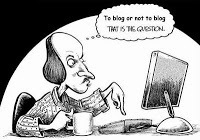 writing center (and maintain this and other writing-related blogs) a question I get asked a lot is "What do I major in if I want to be a writer?" Because I'm online in several places, those questions now come more often as emails and messages
writing center (and maintain this and other writing-related blogs) a question I get asked a lot is "What do I major in if I want to be a writer?" Because I'm online in several places, those questions now come more often as emails and messages
Here's an actual message sent to me on Tumblr the other day...
Pages to type before I sleep...: Writing isn't a major, it's a lifestyle choice: Ad...: Because I work in a college
 writing center (and maintain this and other writing-related blogs) a question I get asked a lot is "What do I major in if I want to be a writer?" Because I'm online in several places, those questions now come more often as emails and messages
writing center (and maintain this and other writing-related blogs) a question I get asked a lot is "What do I major in if I want to be a writer?" Because I'm online in several places, those questions now come more often as emails and messagesHere's an actual message sent to me on Tumblr the other day...
"I'm a freshman in college with an undecided major. What do you think my major should be if I want to be a writer for magazines and websites maybe eventually write a book one day?"The correct answer is: Whatever you want to major in is fine. Writing isn't a major, it's a lifestyle choice.I've said it before and will say it again:=....
Published on June 05, 2013 08:16
May 31, 2013
Chatting with Shawna Reppert

Yes, that's two posts this week, and two authors! Shawna Reppert's new novel, The Stolen Luck (Carina Press), is a fantasy, an adventure, and a curious love story in a world shared uncomfortably by elves and men.
We got together the other day for a few probing questions.
Oh, and when you get to the bottom, there's a very nice giveaway!

MSW: Hi, Shawna! What's the story about your new book?
Shawna Reppert: How far will even a good man go to save the home and the people he loves? In The Stolen Luck, Lord James Dupree has to answer that very question when he embarks on a perilous journey with an elven slave.
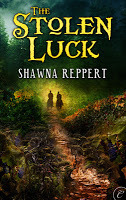
The ancient elven talisman known as the Dupree Luck once made the Dupree wine prized above all else, and that wine made the family’s fortune. Bur James’s father has been murdered and the Luck stolen, and both the thief and the Luck have disappeared into the Lands Between. The vineyard is failing and creditors are closing in; James’ only hope to recover the Luck is Loren, an elven slave he risked much to win in a card game.
Despite his abhorrence of slavery, James cannot free Loren until the elf has helped him cross over to the elven lands to recover the Luck, and so James violates ancestor’s beliefs and traditions in an attempt to save his ancestral home. But James finds owning another person changes him in subtle ways. A friendship grows between Loren during the desperate journey that may kill them both before they can reclaim the Luck. James need to command Loren is at odds with that friendship. Worse, James finds himself falling for Loren. The crisis of conscience escalates when a hidden enemy moves against them. James must choose between the Luck he needs and the elf he has come to love. He was prepared to gamble his honor for the Luck, but his heart and his soul are really what’s at stake.
MSW: What would you say inspired you the most when you were developing this story line? What kept you going?
Shawna Reppert: It all started with a comment a friend of mine had made. I can’t even remember the context, but she said that the tragedy of imbalance of power is not just what it does to the powerless, but also what it does to the soul of the one in power. I tucked it away in the back of my mind as a theme I wanted to explore in fiction.
Shortly after, I got to talking with another friend about tropes that are too often badly handled in fiction. We both agreed that the master/slave relationship came near the top of the list of badly done plot devices. If someone is a slave owner raised in a culture where slavery is the norm, that person is unlikely to have moral qualms about treating another person as property. Someone who doesn’t believe in slavery is unlikely to have a slave. Of course, being a writer, I instantly challenged myself to find a way to make the trope work as realistic and interesting fiction. I realized I could take a character adamantly opposed to slavery and give him a compelling reason to acquire and keep a slave. The moral stakes that drive him have to be high enough to equal the immorality of owning another person.
The obvious question is why? And what does the character in this dilemma do? And what effect does the decision have on them?
The earlier comment about imbalance of power came to mind. At this point, the whole thing remained an intellectual exercise.
But a few months later, I was stuck in a hotel room because the pipes had frozen in my home. There was about six inches of layered snow and ice on the roads with more falling, and I couldn’t get back to check on my house. Daytime television couldn’t keep my mind off the possibility of disaster.
I was working on another novel at the time, but kept getting blocked. So I dug the idea about slavery and imbalance of power out of the dusty recesses of my mind and started writing.
I soon found myself absolutely hooked on the characters and world I had created. There was no turning back.
MSW: The motif of slavery is a very chancy one and likely to make many readers uncomfortable. Can you talk a little about that? Your choices, decisions, intentions, and so on?
Shawna Reppert: I realized from the beginning that the book was going to be a tough sell because of the slavery motif. Not that I had any qualms about my approach as described above, but I was afraid editors and readers would find the topic so unsettling that they wouldn’t see past the word ‘slave’ to look at how I was exploring the theme. It’s absolutely not your typical master-slave trope story, but rather the antidote. Unfortunately, when you try to turn a trope inside out, it’s hard to pitch it without everyone seeing the original trope.
I actually abandoned the novel several times because I was so uncomfortable with the idea of taking it through the pitch process once it was complete, but the novel kept riding me and demanding to be written.
I still get raised eyebrows when I try to tell people about the novel, and I find myself talking fast to convince my audience that no, it’s not one of those novels. One of the few bad reviews I got on Goodreads was from someone who was looking for BDSM and didn’t find any (what my one friend called ‘a bad review that’s actually a good review’)
MSW: The Stolen Luck is essentially an adventure, which is also a love story not only between two men, but between master and slave. Was that part of your original intention, or did the characters surprise you?
Shawna Reppert: That was very much not part of the original plan. When the story started moving that way, I knew it was going to make the dynamic even more uncomfortable for everyone, including myself. But at the end of the day, the best books are the ones that aren’t ‘safe’ but take us beyond our comfort zone and make us think.
The attraction between James and Loren arises very organically out of who the characters are. I actually fought writing it at first, nearly as hard as the characters fought the attraction itself, but in the end the story not only demanded to be written, it demanded to be written in a certain way.
 And from the rules-of-writing standpoint, the attraction between them is a very powerful dynamic. As a writer, you always ask yourself how you can make your protagonist’s situation even worse. James is honorable down to the core. He tells Loren that he would take no one against their will, not elf nor maid nor mortal man, and a slave cannot consent because a slave cannot refuse. He means what he says, and when he finds himself more and more in love with Loren, his heart is breaking with the things he cannot, in conscience, express, and his original dilemma takes on even more depth.
And from the rules-of-writing standpoint, the attraction between them is a very powerful dynamic. As a writer, you always ask yourself how you can make your protagonist’s situation even worse. James is honorable down to the core. He tells Loren that he would take no one against their will, not elf nor maid nor mortal man, and a slave cannot consent because a slave cannot refuse. He means what he says, and when he finds himself more and more in love with Loren, his heart is breaking with the things he cannot, in conscience, express, and his original dilemma takes on even more depth.For Loren, it’s hard enough to come to terms with the fact that he has learned to like and respect his new master. He senses James’s feelings before he acknowledges his own, and his fondness for the man makes him hurt for his heartache.
When he finally realizes his own feelings, he knows he must keep them hidden. In his view, no good can come between love between a slave and his master, nor between an elf and a mortal man.
I realized I had set up the ultimate impossible love, and though I consider myself a fantasy writer, not a romance writer, it was just too good to pass up.
MSW: When I’m writing, I sometimes enjoy the research even more than the writing, and sometimes stumble over amazingly useful details quite by accident. Did you have to do any research for this book? If so, what kind of topics did you pursue and what sort of places did they take you?
Shawna Reppert: Oh, I had a lot of fun researching this book. I live in the heart of Oregon’s wine country, probably the reason my subconscious gave me a vintner protagonist. The year I started the first draft, local wineries had gotten together and offered Wineology 101, a self-guided wine tour with tastings and lectures on various topics about wine and winemaking at each stop.
Usually when a writer goes out to research, she comes home with an armload of books, not half a case of wine.

More important, I learned about the risky nature of the vintner’s life, which gave me a nice thematic pairing with James’s skill with cards. I learned how to talk about wines, and sampled a port that was pure ambrosia and became the inspiration for the fortified wine James shares with Loren on their first night at Dupree Manor. I learned about some of the technical growing decisions that made the basis for James’s conversations with elven vintners in the Lands Between. I learned about the importance of timing the harvest (‘the crush’ as winemakers call it), which gave me a ticking clock where I needed one to ratchet up the tension.
And I saw and heard firsthand the passion of vintners for their wines and for their vineyards, which allowed me to imbue James with that very passion.
MSW: What can we look for from you in future books?
Shawna Reppert: I am preparing to indie-publish an urban fantasy, Ravensblood, set in a parallel-universe version of Portland, Oregon. It’s a world of impossible choices, where sometimes death magic is the lesser of the evils and a dark mage struggles to save the Three Communities and his own soul.
Corwyn Ravenscroft, last scion of a family of dark mages, struggles to save the Three Communities and his own soul. He turns spy against his master, who would overturn the democratically elected Council in favor of the ancient system where the most powerful mage ruled. His contact with the Council is Cassandra, a former apprentice and former lover, whom he once betrayed. Cass is a Guardian now, trying to live down her dark past until that past
 came to her door, begging for help.
came to her door, begging for help.Ravensblood has gotten rave reviews from all my preliminary readers, including a woman from France who liked it so much that she came out to the Pacific Northwest on vacation so I could take her on the Ravensblood tour of Portland and surrounding areas.
Hopefully that will keep readers satisfied while I finish and market my newest work-in-progress, a steampunk/Victorian detective novel. Sort of like Sherlock Holmes if Holmes was a reluctantly-involved werewolf, Watson was a woman alchemist with attitude and Lestrade wasn’t and idiot.
There’s also a medieval fantasy making the marketing rounds and trying to find a home with traditional publishers, a sequel to Ravensblood outlined and awaiting my attention, and plans for a series of novels to follow the steampunk/Victorian detective novel.
 About ShawnaFrom earliest childhood, Shawna Reppert has had a passion for stories– for reading them and for writing them. She obtained a BA in English with a Writing Option from Penn State University and has participated in numerous writing workshops and seminars given by the likes of Charles de Lint, David Farland and Elizabeth Lyon. Two of her stories have won honorable mentions from Writers of the Future. Previous short stories sold to 10 Flash Quarterly and to Everyday Fiction. Several ‘indie’ short stories are available for sale at Amazon, and her story ‘The Beast Within’ appears in the steampunk anthology Gears and Levers 2 edited by Phyllis Irene Radford. Her first novel is due out as a Carina Press e-book in the summer of 2013.
About ShawnaFrom earliest childhood, Shawna Reppert has had a passion for stories– for reading them and for writing them. She obtained a BA in English with a Writing Option from Penn State University and has participated in numerous writing workshops and seminars given by the likes of Charles de Lint, David Farland and Elizabeth Lyon. Two of her stories have won honorable mentions from Writers of the Future. Previous short stories sold to 10 Flash Quarterly and to Everyday Fiction. Several ‘indie’ short stories are available for sale at Amazon, and her story ‘The Beast Within’ appears in the steampunk anthology Gears and Levers 2 edited by Phyllis Irene Radford. Her first novel is due out as a Carina Press e-book in the summer of 2013.In college, Shawna volunteered at a raptor rehabilitation center, which became valuable background for her short story The Sword and the Kestrel. Shawna has always had an affinity for wolves, and used to keep a wolf-dog hybrid as a pet. Her current four-footed children are a Lipizzan stallion and an orange-and-black cat named Samhain. She enjoys Irish social dancing and is an ardent supporter of live Irish music. Shawna also likes to play with the Society for Creative Anachronism and can sometimes be found in medieval garb on a caparisoned horse, throwing javelins into innocent hay bales that never did anything to her.
A Pennsylvania native, she currently lives in the beautiful wine county of Oregon.
 For more of Shawna ReppertBuy The Stolen Luck at AmazonGet the audio version from Audible!
For more of Shawna ReppertBuy The Stolen Luck at AmazonGet the audio version from Audible!And of course, check out her website for more!
 GIVEAWAY
! To celebrate the end of Launch Month, the author is giving away a Winelight. This is a cool ceramic cork-shaped thing-a-ma-bob with a wick that will fit into the top of almost any wine bottles to turn it into an oil lamp. If you don't already have a bottle you love, it comes with a custom wine label with The Stolen Luck book cover to turn a plain wine bottle into a commemorative wine bottle. Label autographed upon request.
GIVEAWAY
! To celebrate the end of Launch Month, the author is giving away a Winelight. This is a cool ceramic cork-shaped thing-a-ma-bob with a wick that will fit into the top of almost any wine bottles to turn it into an oil lamp. If you don't already have a bottle you love, it comes with a custom wine label with The Stolen Luck book cover to turn a plain wine bottle into a commemorative wine bottle. Label autographed upon request.How to enter: Simply comment on either the interview at Maggie's blog or on the author's latest blog over at www.Shawna-Reppert.com by 11:59 pm (Pacific time), Saturday, June 1, 2013. So if you comment both places, that is 2 entries for you! Winner will be announced in both locatio
ns.
Published on May 31, 2013 07:00
Yes, that's two posts this week, and two authors! Shawna ...

Yes, that's two posts this week, and two authors! Shawna Reppert's new novel, The Stolen Luck (Carina Press), is a fantasy, an adventure, and a curious love story in a world shared uncomfortably by elves and men.
We got together the other day for a few probing questions.
Oh, and when you get to the bottom, there's a very nice giveaway!

MSW: Hi, Shawna! What's the story about your new book?
Shawna Reppert: How far will even a good man go to save the home and the people he loves? In The Stolen Luck, Lord James Dupree has to answer that very question when he embarks on a perilous journey with an elven slave.

The ancient elven talisman known as the Dupree Luck once made the Dupree wine prized above all else, and that wine made the family’s fortune. Bur James’s father has been murdered and the Luck stolen, and both the thief and the Luck have disappeared into the Lands Between. The vineyard is failing and creditors are closing in; James’ only hope to recover the Luck is Loren, an elven slave he risked much to win in a card game.
Despite his abhorrence of slavery, James cannot free Loren until the elf has helped him cross over to the elven lands to recover the Luck, and so James violates ancestor’s beliefs and traditions in an attempt to save his ancestral home. But James finds owning another person changes him in subtle ways. A friendship grows between Loren during the desperate journey that may kill them both before they can reclaim the Luck. James need to command Loren is at odds with that friendship. Worse, James finds himself falling for Loren. The crisis of conscience escalates when a hidden enemy moves against them. James must choose between the Luck he needs and the elf he has come to love. He was prepared to gamble his honor for the Luck, but his heart and his soul are really what’s at stake.
MSW: What would you say inspired you the most when you were developing this story line? What kept you going?
Shawna Reppert: It all started with a comment a friend of mine had made. I can’t even remember the context, but she said that the tragedy of imbalance of power is not just what it does to the powerless, but also what it does to the soul of the one in power. I tucked it away in the back of my mind as a theme I wanted to explore in fiction.
Shortly after, I got to talking with another friend about tropes that are too often badly handled in fiction. We both agreed that the master/slave relationship came near the top of the list of badly done plot devices. If someone is a slave owner raised in a culture where slavery is the norm, that person is unlikely to have moral qualms about treating another person as property. Someone who doesn’t believe in slavery is unlikely to have a slave. Of course, being a writer, I instantly challenged myself to find a way to make the trope work as realistic and interesting fiction. I realized I could take a character adamantly opposed to slavery and give him a compelling reason to acquire and keep a slave. The moral stakes that drive him have to be high enough to equal the immorality of owning another person.
The obvious question is why? And what does the character in this dilemma do? And what effect does the decision have on them?
The earlier comment about imbalance of power came to mind. At this point, the whole thing remained an intellectual exercise.
But a few months later, I was stuck in a hotel room because the pipes had frozen in my home. There was about six inches of layered snow and ice on the roads with more falling, and I couldn’t get back to check on my house. Daytime television couldn’t keep my mind off the possibility of disaster.
I was working on another novel at the time, but kept getting blocked. So I dug the idea about slavery and imbalance of power out of the dusty recesses of my mind and started writing.
I soon found myself absolutely hooked on the characters and world I had created. There was no turning back.
MSW: The motif of slavery is a very chancy one and likely to make many readers uncomfortable. Can you talk a little about that? Your choices, decisions, intentions, and so on?
Shawna Reppert: I realized from the beginning that the book was going to be a tough sell because of the slavery motif. Not that I had any qualms about my approach as described above, but I was afraid editors and readers would find the topic so unsettling that they wouldn’t see past the word ‘slave’ to look at how I was exploring the theme. It’s absolutely not your typical master-slave trope story, but rather the antidote. Unfortunately, when you try to turn a trope inside out, it’s hard to pitch it without everyone seeing the original trope.
I actually abandoned the novel several times because I was so uncomfortable with the idea of taking it through the pitch process once it was complete, but the novel kept riding me and demanding to be written.
I still get raised eyebrows when I try to tell people about the novel, and I find myself talking fast to convince my audience that no, it’s not one of those novels. One of the few bad reviews I got on Goodreads was from someone who was looking for BDSM and didn’t find any (what my one friend called ‘a bad review that’s actually a good review’)
MSW: The Stolen Luck is essentially an adventure, which is also a love story not only between two men, but between master and slave. Was that part of your original intention, or did the characters surprise you?
Shawna Reppert: That was very much not part of the original plan. When the story started moving that way, I knew it was going to make the dynamic even more uncomfortable for everyone, including myself. But at the end of the day, the best books are the ones that aren’t ‘safe’ but take us beyond our comfort zone and make us think.
The attraction between James and Loren arises very organically out of who the characters are. I actually fought writing it at first, nearly as hard as the characters fought the attraction itself, but in the end the story not only demanded to be written, it demanded to be written in a certain way.
 And from the rules-of-writing standpoint, the attraction between them is a very powerful dynamic. As a writer, you always ask yourself how you can make your protagonist’s situation even worse. James is honorable down to the core. He tells Loren that he would take no one against their will, not elf nor maid nor mortal man, and a slave cannot consent because a slave cannot refuse. He means what he says, and when he finds himself more and more in love with Loren, his heart is breaking with the things he cannot, in conscience, express, and his original dilemma takes on even more depth.
And from the rules-of-writing standpoint, the attraction between them is a very powerful dynamic. As a writer, you always ask yourself how you can make your protagonist’s situation even worse. James is honorable down to the core. He tells Loren that he would take no one against their will, not elf nor maid nor mortal man, and a slave cannot consent because a slave cannot refuse. He means what he says, and when he finds himself more and more in love with Loren, his heart is breaking with the things he cannot, in conscience, express, and his original dilemma takes on even more depth.For Loren, it’s hard enough to come to terms with the fact that he has learned to like and respect his new master. He senses James’s feelings before he acknowledges his own, and his fondness for the man makes him hurt for his heartache.
When he finally realizes his own feelings, he knows he must keep them hidden. In his view, no good can come between love between a slave and his master, nor between an elf and a mortal man.
I realized I had set up the ultimate impossible love, and though I consider myself a fantasy writer, not a romance writer, it was just too good to pass up.
MSW: When I’m writing, I sometimes enjoy the research even more than the writing, and sometimes stumble over amazingly useful details quite by accident. Did you have to do any research for this book? If so, what kind of topics did you pursue and what sort of places did they take you?
Shawna Reppert: Oh, I had a lot of fun researching this book. I live in the heart of Oregon’s wine country, probably the reason my subconscious gave me a vintner protagonist. The year I started the first draft, local wineries had gotten together and offered Wineology 101, a self-guided wine tour with tastings and lectures on various topics about wine and winemaking at each stop.
Usually when a writer goes out to research, she comes home with an armload of books, not half a case of wine.

More important, I learned about the risky nature of the vintner’s life, which gave me a nice thematic pairing with James’s skill with cards. I learned how to talk about wines, and sampled a port that was pure ambrosia and became the inspiration for the fortified wine James shares with Loren on their first night at Dupree Manor. I learned about some of the technical growing decisions that made the basis for James’s conversations with elven vintners in the Lands Between. I learned about the importance of timing the harvest (‘the crush’ as winemakers call it), which gave me a ticking clock where I needed one to ratchet up the tension.
And I saw and heard firsthand the passion of vintners for their wines and for their vineyards, which allowed me to imbue James with that very passion.
MSW: What can we look for from you in future books?
Shawna Reppert: I am preparing to indie-publish an urban fantasy, Ravensblood, set in a parallel-universe version of Portland, Oregon. It’s a world of impossible choices, where sometimes death magic is the lesser of the evils and a dark mage struggles to save the Three Communities and his own soul.
Corwyn Ravenscroft, last scion of a family of dark mages, struggles to save the Three Communities and his own soul. He turns spy against his master, who would overturn the democratically elected Council in favor of the ancient system where the most powerful mage ruled. His contact with the Council is Cassandra, a former apprentice and former lover, whom he once betrayed. Cass is a Guardian now, trying to live down her dark past until that past
 came to her door, begging for help.
came to her door, begging for help.Ravensblood has gotten rave reviews from all my preliminary readers, including a woman from France who liked it so much that she came out to the Pacific Northwest on vacation so I could take her on the Ravensblood tour of Portland and surrounding areas.
Hopefully that will keep readers satisfied while I finish and market my newest work-in-progress, a steampunk/Victorian detective novel. Sort of like Sherlock Holmes if Holmes was a reluctantly-involved werewolf, Watson was a woman alchemist with attitude and Lestrade wasn’t and idiot.
There’s also a medieval fantasy making the marketing rounds and trying to find a home with traditional publishers, a sequel to Ravensblood outlined and awaiting my attention, and plans for a series of novels to follow the steampunk/Victorian detective novel.
 About ShawnaFrom earliest childhood, Shawna Reppert has had a passion for stories– for reading them and for writing them. She obtained a BA in English with a Writing Option from Penn State University and has participated in numerous writing workshops and seminars given by the likes of Charles de Lint, David Farland and Elizabeth Lyon. Two of her stories have won honorable mentions from Writers of the Future. Previous short stories sold to 10 Flash Quarterly and to Everyday Fiction. Several ‘indie’ short stories are available for sale at Amazon, and her story ‘The Beast Within’ appears in the steampunk anthology Gears and Levers 2 edited by Phyllis Irene Radford. Her first novel is due out as a Carina Press e-book in the summer of 2013.
About ShawnaFrom earliest childhood, Shawna Reppert has had a passion for stories– for reading them and for writing them. She obtained a BA in English with a Writing Option from Penn State University and has participated in numerous writing workshops and seminars given by the likes of Charles de Lint, David Farland and Elizabeth Lyon. Two of her stories have won honorable mentions from Writers of the Future. Previous short stories sold to 10 Flash Quarterly and to Everyday Fiction. Several ‘indie’ short stories are available for sale at Amazon, and her story ‘The Beast Within’ appears in the steampunk anthology Gears and Levers 2 edited by Phyllis Irene Radford. Her first novel is due out as a Carina Press e-book in the summer of 2013.In college, Shawna volunteered at a raptor rehabilitation center, which became valuable background for her short story The Sword and the Kestrel. Shawna has always had an affinity for wolves, and used to keep a wolf-dog hybrid as a pet. Her current four-footed children are a Lipizzan stallion and an orange-and-black cat named Samhain. She enjoys Irish social dancing and is an ardent supporter of live Irish music. Shawna also likes to play with the Society for Creative Anachronism and can sometimes be found in medieval garb on a caparisoned horse, throwing javelins into innocent hay bales that never did anything to her.
A Pennsylvania native, she currently lives in the beautiful wine county of Oregon.
 For more of Shawna ReppertBuy The Stolen Luck at AmazonGet the audio version from Audible!
For more of Shawna ReppertBuy The Stolen Luck at AmazonGet the audio version from Audible!And of course, check out her website for more!
 GIVEAWAY
! To celebrate the end of Launch Month, the author is giving away a Winelight. This is a cool ceramic cork-shaped thing-a-ma-bob with a wick that will fit into the top of almost any wine bottles to turn it into an oil lamp. If you don't already have a bottle you love, it comes with a custom wine label with The Stolen Luck book cover to turn a plain wine bottle into a commemorative wine bottle. Label autographed upon request.
GIVEAWAY
! To celebrate the end of Launch Month, the author is giving away a Winelight. This is a cool ceramic cork-shaped thing-a-ma-bob with a wick that will fit into the top of almost any wine bottles to turn it into an oil lamp. If you don't already have a bottle you love, it comes with a custom wine label with The Stolen Luck book cover to turn a plain wine bottle into a commemorative wine bottle. Label autographed upon request.How to enter: Simply comment on either the interview at Maggie's blog or on the author's latest blog over at www.Shawna-Reppert.com by 11:59 pm (Pacific time), Saturday, June 1, 2013. So if you comment both places, that is 2 entries for you! Winner will be announced in both locatio
ns.
Published on May 31, 2013 07:00
May 29, 2013
Ailsa Abraham: Not Just Mad... Corvid Mad!

British ex-pat author Ailsa Abraham (she's lived in France for over 20 years now) is simply one of my favorite people. Witch, shaman, counsellor, healer, teddy bear mechanic, she's an amazingly multi-faceted woman, and this week, she's graced us with this wonderful true story.
 I was delighted when Maggie asked me to write a spot for her blog because apart from being fellow-authors at Crooked Cat Publishing, we share a passion for Fae, magic and… ravens.
I was delighted when Maggie asked me to write a spot for her blog because apart from being fellow-authors at Crooked Cat Publishing, we share a passion for Fae, magic and… ravens.When did it start? I'm not sure. As a child I was fascinated by Norse mythology and read anything I could get my hands on, to the point where, by the age of ten, I could write runic—a skill I have now unfortunately forgotten. Asgard was as real to me as the village around us, and its gods felt as familiar as my neighbours.
Ravens figure highly in the sagas. Odin, chief of the gods, has his messengers Hugin and Munir who fly over the world bringing back news to their master of the doings of men. So if you see a raven watching you, be careful what you say because it could go straight back to the ears of the One-Eyed All-Father.

Corvids (crows, ravens, jackdaws, rooks) are the most intelligent of birds, able to solve problems and learn tricks very quickly, but only if they want to, as I was to learn when I finally made friends with a real live raven. In my thirties I made an ill-advised job choice and went to work in a zoo. The only bright spot in this hellish year of my life was being able to meet Ragnar who was miserable and getting up to mischief in a cage, stealing gloves, hats and jewellery from visitors. I had to rescue him.
The zoo had a raptor demo, and no other falconry display at that time was using a raven, so when I showed an interest I was told that if I did it in my own time, I could train the raven up. YES! This was the excuse I needed to jess him up and spend hours walking around with Ragnar sat on my fist, just getting used to each other.
That period over, he soon became the star of the show. Birds of prey are magnificent but a bit dull. They fly to the fist for the reward of the dead chick in the falconer's hand and once they are full, that's it, show over, they won't play any more. Ragnar however, was a showman. He performed for the thrill of applause and laughter, so we made an unbeatable pair.
Our spot should have consisted of me telling the folks about ravens, flying him about a bit and then walking down the line for photographs. Far too tame! I would put Ragnar on a post, asking him to stay there and walked off speaking over my throat mike,
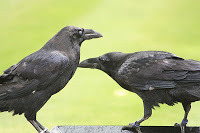 “So I'll just go over here and call Ragnar to me and he'll fly. Then I'd turn around and do a double-take. The top of the post was empty and my friend had hopped down to stroll along behind me, to the amusement of the crowds. He was now sitting at my feet, looking up at me with his head cocked to one side and I would have to order him back to the post. All this, of course, with him unattached and free to fly away at any time. He didn't because he was having too much fun and the bond between us was too strong.
“So I'll just go over here and call Ragnar to me and he'll fly. Then I'd turn around and do a double-take. The top of the post was empty and my friend had hopped down to stroll along behind me, to the amusement of the crowds. He was now sitting at my feet, looking up at me with his head cocked to one side and I would have to order him back to the post. All this, of course, with him unattached and free to fly away at any time. He didn't because he was having too much fun and the bond between us was too strong. Having landed on the post he would put his back to me and ignore my amplified calls of “Come on then, Ragnar! Hey! Rag-bag! Oi! You! Excuse me? Can you hear me, birdie?” By which time the people were enthralled. Ragnar had them eating out of his claws. Eventually he would co-operate and
fly towards me, circling my head as I stood with my fist out, waiting for him to finish showing off. He would then land and execute a perfect bow to the crowd. A master entertainer!
To this moment, the saddest day of my life is when the zoo owner separated us and Ragnar, after a few thwarted attempts to get back to me, starved himself to death. My efforts to save him were futile. I have cried less when family members departed, but I still have his magnificent spirit with me and the memory of one glorious year of unending fun with my handsome, clever friend – Ragnar the Raven, who even sounds like a character from Norse mythology in his own right.

 For more Ailsa Abraham
For more Ailsa AbrahamCrooked Cat Publishing
Ailsa's website
Her Amazon author page
Published on May 29, 2013 01:00
May 22, 2013
An Interview with Pamela Kelt
 In her many years in journalism, Pamela Kelt has seen highs and lows, scandals and shocks, and had her share of thrills. None, we hope, quite as exciting as the ones she writes about in her latest novel, Tomorrow's Anecdote (Crooked Cat, 2013).
In her many years in journalism, Pamela Kelt has seen highs and lows, scandals and shocks, and had her share of thrills. None, we hope, quite as exciting as the ones she writes about in her latest novel, Tomorrow's Anecdote (Crooked Cat, 2013).Pamela was gracious enough to take my questions this week, and talk a little about her work, and especially the new novel.

MPS: Pamela, your latest novel is Tomorrow's Anecdote. Can you tell us something about it?
PK : It’s a dark, and I hope humorous, newsroom thriller set in the late 1980s when Thatcherism was rampant. It has a mystery element, a hint of very British-style romance and nasty skeletons in the family closet. I’d just been working my way through a bunch of Robert Goddards, and I love the way he weaves epic stories about seemingly normal people and their
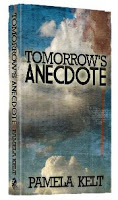 messy lives. Perhaps a bit of that rubbed off.
messy lives. Perhaps a bit of that rubbed off. MPS: Most historical novels (including your other titles) are set a little further back in history than the Thatcher years. What in particular made you select such recent events?
PK : The ‘retro’ feel is pure chance. I was working as a jobbing provincial journalist in those days, and to be honest, I’d never actually planned to write about them. The memories were too raw. It was such a stressful environment: union tensions in the office, entrenched misogyny, job insecurity … Some months back I got a snippy rejection from an agent for another book, full of waspish comments about too many adjectives, or was it adverbs? They didn’t like books in the first person. Blah blah. For some reason, my ‘stress bucket’ overflowed and I decided to write a book in my own ‘voice’, if you’ll forgive such a writerly expression. For some reason it came to me to set it on the eve of the Great Storm. If I were being fancy, I’d say it was an analogy of how easily a safe existence can be turned upside-down, as well as a metaphor for what Thatcherism, in my view, was doing to the country.
 Of course, opening with a storm is gutsy. The story starts with a tree falling onto a car. One reader said she was convinced this had happened to me. It didn’t, thank God, but I saw so many pictures of crushed cars on the fateful morning of October 16, 1987, at work, that the image must have sunk into my subconscious. Oddly enough, when I sent the ms to Crooked Cat, it was exactly 25 years to the day of that event. It was a sign.
Of course, opening with a storm is gutsy. The story starts with a tree falling onto a car. One reader said she was convinced this had happened to me. It didn’t, thank God, but I saw so many pictures of crushed cars on the fateful morning of October 16, 1987, at work, that the image must have sunk into my subconscious. Oddly enough, when I sent the ms to Crooked Cat, it was exactly 25 years to the day of that event. It was a sign. MPS: How much research do your books involve?
PK : Yoiks. My one true weakness. I can spend months, years! doing research. Naively, I thought Tomorrow’s Anecdote wouldn’t require as much. More fool me. I had to do a crash course in the history of modern communications technology and how they evolved. Then I turned to 1980s politics, fashion, music, film, cars, national archives … The next book, Dark Interlude, took even more work. I was all right on 17th-century Spanish drama, more or less, (I know it sounds weird, but the main character is an archivist) but it took months to get up to speed on socialism in Scotland in the early 1900s. Boy, did I read some dusty texts, although I secretly love the academic nature of this type of research. I now try to start writing before I’ve finished the research, otherwise I’d never get round to typing those two magic words ‘The End’.
MPS: When I fall in love with a book, invariably it’s when I can get lost in the descriptions – when it becomes real – sound, image, etc. Other people I know skip the descriptions and go straight to the dialogue. As writers, we are fortunate in being able to get lost in worlds we create. What causes you to get lost when you are writing a book?
PK : Do you know, I suspect I’m very old school. I do like a nice description, but with the ‘show not tell’ school of thought, I know I’m not supposed to get carried away. In fact, I spend a lot of time cutting down large tracts of my own stuff to the bare minimum. This is more of technical job. I only ‘lose myself’ in the book when writing dialogue. I particularly love the first clash between the good guys and the bad. Writing your own subtext is such a blast.
MPS: As a reader, I am very much character-driven. What do you do in order to make your characters interesting to readers?
PK : I poke at them until I know every weakness – heroes and villains alike. It’s quite a subtle process to expose goodies and baddies to scenarios where the reader can see subtle changes happening. If characters don’t change, they’re just cardboard cutouts and dull, dull, dull.
MPS: What would you say inspires you the most when you are developing any new story line? People, events, settings, or something else?

PK : Apart from Tomorrow’s Anecdote, my personal therapeutic rant, I’d say settings every time. My first completed book, The Lost Orchid, is actually set in Kenilworth, was inspired by some of lovely, leafy scenery and a classic Gothic mansion just down the road. Dark Interlude is based on my many trips to Scotland. All of my family is now living there, and I get north of the border as often as I can. Other titles are based on travels to Norway, the Czech Republic and Montenegro. My husband’s got a conference in Mexico later this year, and I’m tagging along. He’s already asking me what book that will produce.
MPS: What will you do first when you come to power?
PK: Can I have three wishes? If so, after rubbing my hands with glee, I’d make the National Curriculum less prescriptive and urge research councils and universities to allow academics more intellectual freedom when it comes to research. Next, I’d divert sufficient funds from pointless quangos to ensure that every child of reading age has an e-reader or tablet of their own.

 Want more?Follow Pamela on Twitter and Facebook. Find out all the latest on my author website and blog. Or why not send an email to [email protected]? Find her author pages on Amazon.co.uk, Amazon.com, Goodreads and Smashwords.
Want more?Follow Pamela on Twitter and Facebook. Find out all the latest on my author website and blog. Or why not send an email to [email protected]? Find her author pages on Amazon.co.uk, Amazon.com, Goodreads and Smashwords. Tomorrow’s Anecdote is available from Crooked Cat (e-book) and in both digital form and paperback on Amazon.
Published on May 22, 2013 01:00
May 15, 2013
Author James K. Burk: Exploring Character
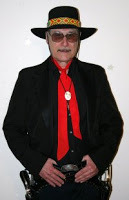
In his latest fantasy, James K. Burk experiments with not just two or even three points of view, but with twelve, including a wide range of age and sex, and one outsider to whom everything he sees is new and foreign. That means he had to think about the issues of culture, attitudes, religion, even clothing and eating habits, in some detail when he started out. I'll let him explain.
 One of the greatest challenges of writing is the creation of an engaging and memorable character. The character need not be likable, but the reader should be able to look at the world through that character’s eyes. That is, in my experience, best achieved by using a limited third-person point of view. Other techniques will work but I prefer that approach because it allows the writer to display to the reader the values and ethics of the character through their perceptions. My novel The Twelve was written at least partly as a writer’s challenge. One has a tendency to slip comfortably into only one or two character types. In The Twelve, I wanted to show twelve different points of view. The first hurdle in that sort of game is to let the reader know, at all times, whose head they’re inside and whose eyes they’re looking out of. This was addressed by breaking up the story into short chapters with the name of the viewpoint character as the title of the chapter.
One of the greatest challenges of writing is the creation of an engaging and memorable character. The character need not be likable, but the reader should be able to look at the world through that character’s eyes. That is, in my experience, best achieved by using a limited third-person point of view. Other techniques will work but I prefer that approach because it allows the writer to display to the reader the values and ethics of the character through their perceptions. My novel The Twelve was written at least partly as a writer’s challenge. One has a tendency to slip comfortably into only one or two character types. In The Twelve, I wanted to show twelve different points of view. The first hurdle in that sort of game is to let the reader know, at all times, whose head they’re inside and whose eyes they’re looking out of. This was addressed by breaking up the story into short chapters with the name of the viewpoint character as the title of the chapter.
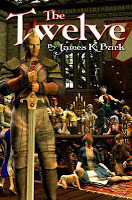 As a writer, the next trick was to actually perceive the world as the characters did. Since the characters were of both sexes and from late teens or early twenties into quite elderly ages, this requires a writer to employ a literary version of method acting. One’s outlook depends partly upon the state of one’s health, as well as age, sex , and the culture at large. The writer must, therefore, take all these factors into account when sharing the characters’ perceptions. In fantasy and science fiction, the writer must also be intimately familiar with the culture or cultures within which the story has been set and must convey it to the reader. A culture is part and parcel of the character, whether he or she reflects the culture or rebels against it, and it has so many ramifications that it is the sea in which the character swims. Again, the writer must have a clear vision of the society. Is the culture largely shaped by religion or is religion largely ignored? For example, Iceland converted to Christianity around the year 1000 but it made a negligible difference in the daily life of the people. Rather than being deeply pagan or deeply Christian, the Icelandic “religion” was a sort of aggressive fatalism. What was fated to happen could happen and was inescapable. One had a store of good luck and when it was used up, that person was doomed. What was important was the fortitude with which one met the inevitable. Most fatalistic cultures tend to be passive but, to the Icelanders, it was an incentive to adventure and standing up for what you thought was the right thing. Or, in some cases, the thing wanted, right or not. Culture, sometimes reinforced by religion, is reflected in, among other things, how women, the young, the aged, minorities, strangers, and even servants or slaves were treated, and your character reveals himself or herself by how the character reacts to the people around them. What sort of art is appreciated and practiced? These play a major role in the development of characters. What sort of music do they produce? Are they literate or do they have an oral tradition? Almost every culture uses drawing or painting. Do they have sculpture? What sorts of dances do they perform and for what reasons? Climate and terrain play a very important part in the development of culture but not to the degree that it is predictable. Most highlanders live hard lives of scarcity, even privation, and the result is often a people who are dour, parsimonious, and often reserved or even hostile to other peoples, but might be quite hospitable to lone travelers who bear news of the outside world. Or outsiders might be considered contaminants. Names are sometimes essential to a character, both for a reader and for the character. We often use names with no sense of there meaning but once upon a time (and still in some cultures) names had meaning. For instance, the common name John once meant “God is gracious.” Other common names also have very strong or poetic meanings, and that gives another clue about culture. So the meaning of a name can help display the culture and it may, of course, have its effect on the character. Some cultures consider names to have power, and to protect themselves, may have a true name and a use-name. The use-name will almost always have a meaning but it will never have the same meaning as the true name. For the character to resonate with the reader and seem real to them, the character must have flaws as well as virtues. Given the culture, what we might now see as flaws might be seen by others as desirable traits. Among the Icelanders, words like “formidable” and “ruthless” were not terms of approbation. They were necessary qualities for a leader. So, we have our character and the culture in which he or she lives. Often a writer will get a “twofer” by making the character a stranger in a different culture, which lets the writer introduce the reader and the character to the new culture simultaneously but, unless you’re going to pull A Connecticut Yankee in King Arthur’s Court, the writer must deal with the character’s perceptions being colored by the culture from which they came. Two more quick words of advice; the character, to be believable must sweat and must stain his shirt when he does so; and even minor characters, down almost to the spear-carriers, must be considered characters, not stereotypes. There are two ways to accomplish all this. The writer must either start with a clear vision of the character and the world he or she inhabits, or must edit like a pro. Happy character-building.About James K. BurkJames was born long, long ago in a place far, far away. He had as normal a childhood as one could expect of someone who grew up to be a critic and writer. He was taught (or was that conditioned?) by a succession of nuns and Jesuits. His favorite job was being a Sunday gunman. This was a summer weekend job at an amusement park helping stage old west gunfights. He was usually cast as either the villain or the village idiot. This is called type-casting. He writes everything from fantasy to science fiction to weird westerns.
As a writer, the next trick was to actually perceive the world as the characters did. Since the characters were of both sexes and from late teens or early twenties into quite elderly ages, this requires a writer to employ a literary version of method acting. One’s outlook depends partly upon the state of one’s health, as well as age, sex , and the culture at large. The writer must, therefore, take all these factors into account when sharing the characters’ perceptions. In fantasy and science fiction, the writer must also be intimately familiar with the culture or cultures within which the story has been set and must convey it to the reader. A culture is part and parcel of the character, whether he or she reflects the culture or rebels against it, and it has so many ramifications that it is the sea in which the character swims. Again, the writer must have a clear vision of the society. Is the culture largely shaped by religion or is religion largely ignored? For example, Iceland converted to Christianity around the year 1000 but it made a negligible difference in the daily life of the people. Rather than being deeply pagan or deeply Christian, the Icelandic “religion” was a sort of aggressive fatalism. What was fated to happen could happen and was inescapable. One had a store of good luck and when it was used up, that person was doomed. What was important was the fortitude with which one met the inevitable. Most fatalistic cultures tend to be passive but, to the Icelanders, it was an incentive to adventure and standing up for what you thought was the right thing. Or, in some cases, the thing wanted, right or not. Culture, sometimes reinforced by religion, is reflected in, among other things, how women, the young, the aged, minorities, strangers, and even servants or slaves were treated, and your character reveals himself or herself by how the character reacts to the people around them. What sort of art is appreciated and practiced? These play a major role in the development of characters. What sort of music do they produce? Are they literate or do they have an oral tradition? Almost every culture uses drawing or painting. Do they have sculpture? What sorts of dances do they perform and for what reasons? Climate and terrain play a very important part in the development of culture but not to the degree that it is predictable. Most highlanders live hard lives of scarcity, even privation, and the result is often a people who are dour, parsimonious, and often reserved or even hostile to other peoples, but might be quite hospitable to lone travelers who bear news of the outside world. Or outsiders might be considered contaminants. Names are sometimes essential to a character, both for a reader and for the character. We often use names with no sense of there meaning but once upon a time (and still in some cultures) names had meaning. For instance, the common name John once meant “God is gracious.” Other common names also have very strong or poetic meanings, and that gives another clue about culture. So the meaning of a name can help display the culture and it may, of course, have its effect on the character. Some cultures consider names to have power, and to protect themselves, may have a true name and a use-name. The use-name will almost always have a meaning but it will never have the same meaning as the true name. For the character to resonate with the reader and seem real to them, the character must have flaws as well as virtues. Given the culture, what we might now see as flaws might be seen by others as desirable traits. Among the Icelanders, words like “formidable” and “ruthless” were not terms of approbation. They were necessary qualities for a leader. So, we have our character and the culture in which he or she lives. Often a writer will get a “twofer” by making the character a stranger in a different culture, which lets the writer introduce the reader and the character to the new culture simultaneously but, unless you’re going to pull A Connecticut Yankee in King Arthur’s Court, the writer must deal with the character’s perceptions being colored by the culture from which they came. Two more quick words of advice; the character, to be believable must sweat and must stain his shirt when he does so; and even minor characters, down almost to the spear-carriers, must be considered characters, not stereotypes. There are two ways to accomplish all this. The writer must either start with a clear vision of the character and the world he or she inhabits, or must edit like a pro. Happy character-building.About James K. BurkJames was born long, long ago in a place far, far away. He had as normal a childhood as one could expect of someone who grew up to be a critic and writer. He was taught (or was that conditioned?) by a succession of nuns and Jesuits. His favorite job was being a Sunday gunman. This was a summer weekend job at an amusement park helping stage old west gunfights. He was usually cast as either the villain or the village idiot. This is called type-casting. He writes everything from fantasy to science fiction to weird westerns.Besides his shorter work, Burk has two novels currently in print, Home is the Hunter is half of Double Dog #3, and his fantasy novel, The Twelve has received some very satisfying reviews. Check out Amazon's James K. Burk author page for more details
Published on May 15, 2013 06:00
May 7, 2013
Zanna Mackenzie: Writing a Magickal Novel
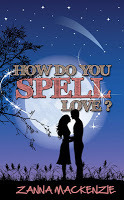 Have you met British author Zanna Mackenzie yet? Oh, you must let me introduce you! She's all about light-hearted romance, comedy, and a twist of magic! She's also a trained therapist, with qualifications in clinical aromatherapy, crystal healing, naturopathic nutrition and herbalism.
Have you met British author Zanna Mackenzie yet? Oh, you must let me introduce you! She's all about light-hearted romance, comedy, and a twist of magic! She's also a trained therapist, with qualifications in clinical aromatherapy, crystal healing, naturopathic nutrition and herbalism.
My novel How Do You Spell Love? (or HDYSL, for short) was recently published by UK publisher Crooked Cat and is a romcom [that’s a romantic comedy, for the uninitiated--*mps] with a magical theme. Now, I love writing, no matter what it is about, but I particularly enjoyed putting this book together because it was so much fun to research and create.
In my book Kat is trying to get over the end of her relationship with Nathan, even though part of her still believes they were meant to be together. Summer is trying to find ways to keep her relationship with Rob on track. Then Kat meets Alex, and Summer meets Tom, and for a whole tangle of reasons Kat shouldn’t be with Alex, and Summer shouldn’t be with Tom, but the attraction and chemistry is instant and causes everyone involved to start questioning their lives and their behaviour.
I love books with a magical theme to them so I decided I wanted to make the character of Summer into a white witch – a person using her abilities to try to help others. She is someone who (mostly!) abides by three strict rules passed down by her gran, whom she inherited her ‘gift’ from. Rule number 1 – only cast spells for good and never wish anyone harm. Rule number 2 – never accept money for casting spells and trying to help people. Rule number 3 – never cast spells for yourself. Unfortunately in HDYSL Summer ends up bending rule number 3 slightly but I think she can be forgiven in the circumstances!
I loved researching the uses of herbs, essential oils and crystals for the spells Summer uses in the book. Of course, all the spells are fictitious and I’ve used artistic licence with them but the meanings mentioned for the herbs and crystals are true to what you will find in reality in old herb craft and magic-with-nature books.
For example, in the ‘old days’ the garden herb rosemary was widely used at weddings, with pieces being tucked into the bride’s bouquet and used by the groom as a boutonniere (button hole). Springs of the herb were also given out to guests attending the ceremony as a kind of wedding favour, tied with gold ribbon. It was believed that the herb would ‘grant sweet memories’ of the happy day.
During the course of my research for HDYSL, I found out the significance of colours when it comes to spell casting. Often coloured rather than white candles are used, with the colour chosen relating to what the spell is for. I was surprised that black is actually a colour to ‘remove negativity’ – you tend to think of black as doing the opposite, I think! Blue is for healing energies, orange for warmth and energising energy, red for love and lust, and gold for wealth.
As well as using herbs, candles and aromatherapy oils Summer also has a collection of crystals she incorporates into spells as well. I used to think that a crystal was just a lump of rock but soon found out that is far from the case. When you learn how different crystals are formed and what from, and how they are structured, it is totally fascinating stuff and you can truly start to appreciate the amazing properties these stones are credited with.
At times during How Do You Spell Love? Summer seriously doubts if she should continue spell casting, doubting her abilities and feeling discouraged as boyfriend Rob heartily disapproves of her ‘meddling’ in other people’s business, but at the same time she feels compelled to continue the traditions of the craft which has been in her family for generations. The way things are going in her life she begins to think that magic is failing her but maybe, just maybe, magic knows the way of things better than she does!

An excerpt from How Do You Spell Love? Kat pushed the last of the cottage cheese and shrimp sandwiches into the cool box and slammed the van door shut. As if her life wasn’t enough of a disaster zone as it was – no money, lousy job, losing Nathan, having to move back home to live with her parents – now this had to go and happen. Plus, of course, it didn’t help that today she was feeling shattered after spending half the night chanting some ridiculous protection spell in the middle of the allotments with Summer.
Cringing as a van full of builders stopped at the nearby traffic lights, Kat braced herself for the inevitable. After the standard-issue wolf whistles had drifted across from their van, next came the leered, “Wouldn’t argue with that, love!” as one of them nodded towards her sparkling clean van, parked neatly at the curb. The words “A Bit of Crumpet on the Road” emblazoned down the side in deep purple, glittery lettering. Not for the first time Kat cursed her boss Janice for calling her bakery-cum-deli that name.
Kat sighed, well it certainly drew comments from the public and from their customers, not always welcome ones, but as Janice was always keen to point out, any kind of publicity and attention was, in her eyes, good publicity and attention.
Pulling her navy and white striped apron more tightly around her T-shirt and shorts, Kat ignored the builders and climbed into her van to begin that morning’s deliveries. As she indicated to pull out into the busy street in Luisborough, she mulled over the bad news – that she was to add the controversial Netherton Meadows housing development to her daily sandwich round.
Netherton Meadows. Yippee. If Summer found out, she’d surely be ostracised for fraternising with the environmental enemy. This was a development that pretty much everyone in Luisborough had fought against for getting on towards a year. It had been the focus of STW campaigns. It went against everything that Kat believed in environmental-wise. Everyone hated the Netherton Meadows developers. Except, it seemed, Janice, who was perfectly happy to, in her words, ‘supply yummy builders with yummy sandwiches.’
Lost in thought, Kat just managed to spot the approaching traffic lights had turned to red and hastily slammed a foot on the brake. The van lurched to a halt and several boxes of crisps and one of the cool boxes in the back tipped over. Damn. It was shaping up to be one of those days.
Two hours later Kat had visited all her usual drops, was extremely hot and bothered, and could put off going to Netherton Meadows no longer.
Driving through the assorted vans, machinery and portacabins Kat parked next to a building marked as being the Site Office and hit the button on the dashboard. Tinkling chimes filled the air as Kat climbed from the driver’s seat and made to open the back doors of the vehicle. It was embarrassing enough that the van had the company name in large lettering along its side but, just to make sure that it received maximum exposure – and achieved maximum embarrassment – Janice had had some irritating chimes fitted to the vehicle too. Kat was under strict instructions to sound the chimes when she called at all of the sites where people came out to the van; such as they were about to at Netherton Meadows.
A man came down the steps of the office with a grin on his face and walked towards her. “Hi, you must be Kat.” He wedged a clipboard under his left arm and offered a hand to shake. “I’m Alex. Project manager for the site.”
“Hi,” mumbled Kat, spotting a group of hard-hat-clad builders advancing towards her with hungry expressions on their faces.
“Right, lads,” Alex turned towards the men. “This is Kat and she’s very kindly agreed to venture onto this site to bring you all your lunch. Don’t give her any hassle, OK?”
The men laughed and then nodded. “Sure, Alex. You’re the boss.”
Fifteen minutes later it seemed that all of the team at the development had made their sandwich, crisp and drink selections and sloped off to devour them in the sunshine. Only one of the builders, a portly man who must have been twenty years Kat’s senior, had pushed the boundaries a little, despite Alex’s earlier warning. As he’d selected a smoked salmon and cream cheese roll – a choice that had surprised Kat somewhat, having pegged him as a ham and cheese kind of guy – he’d asked Kat if she’d fancy joining him for a drink sometime. She’d politely declined his offer, saying that she had a boyfriend. No need to tell him that, technically, she and Nathan were no longer an item. No need to tell him why either.
 About Zanna MackenzieZanna lives in the UK with her husband, 4 dogs, a vegetable patch that’s home to far too many weeds and an ever expanding library of books waiting to be read.
About Zanna MackenzieZanna lives in the UK with her husband, 4 dogs, a vegetable patch that’s home to far too many weeds and an ever expanding library of books waiting to be read. Being a freelance writer and editor of business publications is her ‘day job’ but, at every opportunity, she can be found scribbling down notes on scenes for whatever novel she’s working on. She loves it when the characters in her novels take on minds of their own and start deviating from the original plot!
Formerly a travel agent and therapist (she has qualifications in clinical aromatherapy, crystal healing, naturopathic nutrition and herbalism) she loves walking the dogs and gardening – that’s when she’s not writing or reading!
Zanna has written two novels, The Love Programme (Astraea Press) and How Do You Spell Love? (Crooked Cat Publishing) and both were published in early 2013.
 Find out more about Zanna at:www.zannamackenzie.blogspot.co.ukwww.zannamackenzie.co.ukTwitter: @ZannaMacKenzieFacebook: www.facebook.com/zanna. mackenzie
Find out more about Zanna at:www.zannamackenzie.blogspot.co.ukwww.zannamackenzie.co.ukTwitter: @ZannaMacKenzieFacebook: www.facebook.com/zanna. mackenzieGoodreads - http://www.goodreads.com/user/show/10703273-zanna-mackenzieAmazon Author Page - http://www.amazon.co.uk/Zanna-Mackenzie/e/B00BKY1A18/ref=ntt_dp_epwbk_0
Published on May 07, 2013 01:00
April 30, 2013
Gill James: Writing for Young Adults
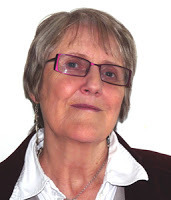 Crooked Cat colleague Gill James writes novels for children and young adults. She also writes shorts stories and flash fiction for adults. She is a prolific blogger and has been known to write an academic paper now and then. She is the Network News editor for SCBWI’s Words and Pictures. http://www.wordsandpics.org/She does have a life beyond writing--she sings the tenor part in a choir.
Crooked Cat colleague Gill James writes novels for children and young adults. She also writes shorts stories and flash fiction for adults. She is a prolific blogger and has been known to write an academic paper now and then. She is the Network News editor for SCBWI’s Words and Pictures. http://www.wordsandpics.org/She does have a life beyond writing--she sings the tenor part in a choir.

My new novel, The Tower (Crooked Cat), is the third part of the Peace Child trilogy. The first part, The Prophecy, was written as part of my PhD in Creative and Critical Writing at the University of Wales, Bangor. A PhD must always bring something new and writing for young adults was new for me – I’d written mainly for younger children up until then. The subtitle was “a global definition of the young adult novel”. I read in several languages so I looked at works written in Dutch, French, German, Spanish, Portuguese and English, and also from several different continents and countries.
My main finding was that young adult novels generally tell a story of growth, so are a type of Bildungsroman. My hero, Kaleem, couldn’t be quite the political figure I’d at first thought. He’s just a normal young man struggling to make sense of the world – albeit one where he is has a demanding role: he has to maintain the peace between two planets. Throughout he is haunted by the Babel prophecy. In this final volume, the reader is offered an explanation about the Babel prophecy and Kaleem grows in confidence. It’s left open to possibilities at the end not because I want to write more volumes but because young adults readers do like to make their own minds up.
In The Prophecy Kaleem learns about his true identity. Babel finds him fighting “switch-off” – compulsory euthanasia for an aging population that refuses to die. My blog, Rozia’s G-log links Babeland The Tower, though you don’t have to read it in order to understand the last volume. A supplementary problem for Kaleem in The Tower is a financial system that is about to collapse. Only the Zenoton can make it all work again. They have a very different attitude to money. Ah! Maybe I should send a copy of The Tower to every major bank?
Through all three volumes there is a love interest – three in fact, but one that dominates. Only too right. That’s another frequent characteristic of the young adult novel.
The Peace Child trilogy is science fantasy and as always in this genre it’s important to make sure your world is logical. I spent months thinking this all out before I started writing. I’d sit in cafés making copious notes and using the environment around me to ask myself questions about what I needed to know of Kaleem’s world. I’m not sure I got it completely right, however. It’s set in 3500 AD on Earth, now called Terrestra. The personal communication device they all use is only a little more sophisticated than the iPhone. I completed the first volume in 2007.
At one point I stopped liking Kaleem. He was becoming a bit of a whinger. “Ah, poor me. I’m not like other kids. And I have all this responsibility.” He was seriously getting on my nerves. We had Judy Waite as a visiting writer at the university where I lecture in creative writing. She had us writing with our “wrong” hand - left for me as I’m right-handed - and then lighting a candle for our characters. I know, it sounds a bit spooky, but it did work. I now love and respect Kaleem for the sensitive, intelligent, brave and warm-hearted young man he really is. I’ve lived with all of the characters from Peace Child for quite a while now and I’m really missing them. It’s possible to read volume three without first reading the other two. Babeland The Tower each include a summary that explains what has gone before. You can find excerpts of The Prophecy on my Sample Sunday blog, and Babel will shortly be free on Amazon. I do hope you enjoy it!

Excerpt
An excerpt from The TowerLouish was as dramatic as ever.
First off, she greets me in a bright royal blue tunic covered in glittery sequins. It was an incredible outfit. It had great pleats in the body of it and the sleeves as well. Mind you, it really suited her. And her make-up! I mean, I’m wearing make-up all the time now, but I try to do it so that it doesn’t show. But Louish! Long curly eyelashes. Thick eye-liner. Bright blue eye shadow that matched her tunic. A huge beauty spot. And lipstick so red it almost looked as if her lips were bleeding.Then there was all her prodding and poking – trying to get things out of me. So much so that I ended up telling as much about Julien as I dared. “Well, my dear,” she said. “You’re looking well. Any sign of any new romance?” At that point, I felt my cheeks burning. “Ah, I see there is,” she said. “Well, do not fear anything from me, sweetie. If that nutcase of a grandson of mine can’t appreciate what is right in front of him, what’s offered to him on a plate, well then he’s even more of a fool that I thought.” She stroked my hair and then gave me a huge hug. I don’t know why exactly, but that set me off. I couldn’t hold back the tears. Was I still sad about Kaleem? Was I pleased she accepted the idea of Julien? Maybe she defined it herself in the end. She sighed. “I’m sure he’s a fine young man, whoever he is,” she said. “But he’ll take you away from our family I expect." The lunch was superb, of course. Louish is always so cheerful and she tells such funny stories. But as we had coffee afterwards she became deadly serious. “I want to arrange a meeting,” she said. “A secret meeting. Between you and Razjosh.” I couldn’t begin to imagine what Razjosh might want with me. “Oh?” I said. “Yes, he wants to discuss the whole switch-off thing with you. Making sure it becomes permanent.” “Ah,” I replied. I couldn’t think that that was going to be easy. He had just had such a narrow escape from switch-off himself. “What does Elder Frazier think?” “He’s all for it, my dear. In fact, he’ll be at the meeting too,” she replied. “You will agree to it, won’t you?” How could I not? Louish is such a well-meaning person. I nodded. “Great!” she said, and beamed. The rest of the afternoon was lovely. We went for a walk together. She told me all about what she and the other elders’ attachments get up to. Despite this rather heavy task she’s landed me with, it always does me good being with her. I really can’t believe she’s a grandmother and that her grandson is grown up. “End and delete,” said Kaleem. That was definitely the last time he would read Rozia’s glog. Now that his grandmother knew about the new man in her life perhaps she would stop nagging him about getting back together with Rozia. Rozia. She was obviously happy with Julien. That had been the plan. Leave her. Allow her to find someone else. There was no place for romance in the life of a Peace Child. He’d even told her that he approved, even made it sound as if he didn’t care. Yet still she was producing her glog in Wordtext. She was doing that for him, he knew. He doubted whether Julien could read Wordtext. And every time now that he read her glog, he just hoped that she still wanted to be with him. But she was with Julien now. Just as he had planned. No point hoping it was otherwise. What was the point, then, of her writing this glog in Wordtext? Was she trying to torment him? There was certainly no point in him reading it anymore. He sighed. What was there to look forward to now, though?
*******************
The Tower appears in both paperback and e-book this week on both Amazon.com and Amazon.co.uk.

ContactYou can find Gill at one of her many blogs
http://roziasglog.blogspot.co.uk/http://gilljames.blogspot.co.uk/(about writing) http://creative-writingteacher.blogspot.co.uk/http://gillssamplesundays.blogspot.co.uk/Samples of The Prophecy -amongst others.http://gillsrecommendedreads.blogspot.co.uk/books I recommend. I only post here those very rare books that take me out of my editing head. I will post other reviews elsewhere and I regularly review for Armadillo Magazine and Troubador.
Her web site: www.gilljames.co.ukhttp://www.seek.salford.ac.uk/profiles/GJAMES.jsp(academic)
On Facebook: https://www.facebook.com/pages/Gill-James-Writer/124132300999524?ref=hl
and Twitter:@gilljames
Published on April 30, 2013 23:30



